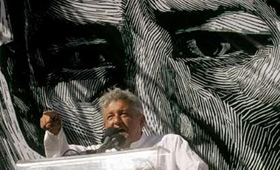 |
 |
 |
 News Around the Republic of Mexico | April 2006 News Around the Republic of Mexico | April 2006  
Left Leads in Countdown to Mexican Elections
 Enrique Andrade González - MexiData.info Enrique Andrade González - MexiData.info


| | With three months left before election, some wonder about former Mexico City mayor's attitude toward business. (Reuters/Stringer) |
As April begins so does the 90-day countdown to Mexico’s national elections on July 2, the first presidential election since the alternant in power of 2000 – when a majority of Mexican voters decided to take the Presidency of the Republic away from the long ruling Institutional Revolutionary Party, the PRI.

As well, this year voters will have the opportunity to choose not just a man, as most did in 2000, but too they will vote for a national project. This since the 2006 election is not simply for a president, but too Mexican voters will select political, economic and social system options for the next 12 or 18 years.

The fact is all three of the main candidates according to their proposals want a capitalist system – however with dissimilar nuances.

On the right is Felipe Calderón of the National Action Party (PAN), a party that is close to bankers and businesspeople, who is proposing a smaller state with a greater presence of the private sector in strategic and priority areas.

The Party of the Democratic Revolution (PRD) and its candidate, Andrés Manuel López Obrador, want a strong state. This party of the left seeks a government that will preside over the Mexican economy, while being responsible for strategic areas with a vision of well-being for those Mexicans in need who are least favored by the neoliberal economic system.

The third proposal, that of the PRI, calls for a mixed economy with the presence of the state, yet with care taken to watch over macroeconomic indices while establishing needed economic reforms that will allow private sector participation. A plan for state control similar to what is identified in Europe as The Third Way.

There are in fact options for the electorate, this in spite of the media promoting ideas of few proposals and fear of change. There are various differences. And the plans and programs that ultimately win will not be just for six years but for at least 12.

Unlike President Vicente Fox, who in 2000 sought only to win and force the PRI from office, the goals of today’s three candidates are not only to win, but also to promote genuine change in Mexico’s political and economic systems in keeping with the natural leanings of their political parties.

The PRD of López Obrador, when he was mayor of Mexico City showed that it knew how to govern in order to stay in power. The PRD has governed the Federal District since 1997, and in 2003 it won a majority in the local legislature.

And to win the presidency on July 2 the PRD will pullout all stops as it further seeks a congressional majority in the 2009 midterm elections. The latter to be coupled with promotional plans already underway to celebrate two important anniversaries in 2010: the bicentennial of the beginning of the 1810 Mexican War of Independence; and the centennial of the Mexican Revolution of 1910.

Should the PAN win it will continue to insist on structural changes, probably with a better political understanding so that, given the second chance, reforms which the current administration erratically sought to accomplish might finally get done.

If the PRI would win, its labor union and campesino corporatist structures will again be strengthened, it could consolidate governments in the states, it will work for a majority in Congress, and alliances would be forged so as to once again hold onto power.

So with just 90 days left until the election, the question becomes is change possible in what the polls say is a quite likely win by López Obrador?

In evaluating prospects, averages in the latest polls must be taken into account. Most recently López Obrador’s lead has been a mean of eight points, indicating that 4.5 million undecided voters – and/or those who might otherwise abstain from voting – will have to cast ballots against him.

Yet change is possible. In the Mexican elections of 2000, with the same amount of time remaining before the election, Fox was behind by six points. In the 2004 elections in Spain, with but seven days left preferences changed more than ten points.

However as of today, the realities are that the PAN candidate is unconvincing and he has been unable to separate himself from Fox. As for the PRI aspirant, he is not being accepted nor is his party being forgiven.

And López Obrador remains ahead not necessarily because he is the best candidate, but since he does not appear to be the worst.

Enrique Andrade, a Mexico City-based attorney and business consultant, writes a weekly column for MexiData.info. He can be reached via e-mail at enriqueag@andradep.com. | 
 | |
 |



